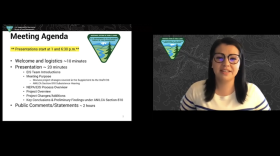
Jennifer Ludden
Jennifer Ludden helps edit energy and environment stories for NPR's National Desk, working with NPR staffers and a team of public radio reporters across the country. They track the shift to clean energy, state and federal policy moves, and how people and communities are coping with the mounting impacts of climate change.
Previously, Ludden was an NPR correspondent covering family life and social issues, including the changing economics of marriage, the changing role of dads, and the ethical challenges of reproductive technology. She's also covered immigration and national security.
Ludden started reporting with NPR while based overseas in West Africa, Europe and the Middle East. She shared in two awards (Overseas Press Club and Society of Professional Journalists) for NPR's coverage of the Kosovo war in 1999, and won the Robert F. Kennedy Award for her coverage of the overthrow of Mobutu Sese Seko in what is now the Democratic Republic of the Congo. When not navigating war zones, Ludden reported on cultural trends, including the dying tradition of storytellers in Syria, the emergence of Persian pop music in Iran, and the rise of a new form of urban polygamy in Africa.
Ludden has also reported from Canada and at public radio stations in Boston and Maine. She's a graduate of Syracuse University with degrees in television, radio, and film production and in English.
-
Many holiday travelers had Christmas Eve flights canceled at the last minute because of the surge in the omicron variant. Airlines say a spike in cases has left them short staffed.
-
In a preemptive move, United, Delta and others canceled dozens of flights scheduled for Friday. They say the omicron spike has left them with staffing shortages.
-
Next month, the temperature averages meteorologists use will get an update. It means the warmer climate will — quite literally — become the new "normal," posing a challenge for forecasters.
-
Former EPA chief Gina McCarthy is President-elect Joe Biden's pick for domestic climate adviser. She'll have a big role pushing for aggressive climate action across the government.
-
The Trump administration is rushing to finalize some of its biggest environmental rollbacks ahead of November's election. Some affected groups say they're too distracted by the pandemic to engage.
-
Global energy demand, particularly for coal, is falling sharply this year, the International Energy Agency says. The drop is caused by weather patterns and COVID-19 shutdowns.
-
The Trump administration is replacing Obama-era fuel economy standards with weaker ones that will allow for more air pollution. Groups are already lining up to challenge the new rule.
-
The move would ease approval for major infrastructure projects. It could mean federal agencies won't need to consider climate impacts of things like pipelines and highways.
-
The Trump administration says only the federal government can set tailpipe emissions standards. It's the latest move in a months long standoff over efforts to weaken a key Obama-era climate rule.
-
In an East Room event that played like a campaign rally, President Trump touted his push for clean air and "crystal clear" water. He made no mention of climate change, a growing concern for voters.
-
The EPA says it will keep limits on toxic mercury emissions from coal plants but now deems them not cost-effective. Environmental groups worry the move could hinder future regulations.
-
The Trump administration released a major climate assessment on Black Friday. It is the most detailed and blunt assessment yet of the dangers of unchecked global warming.









